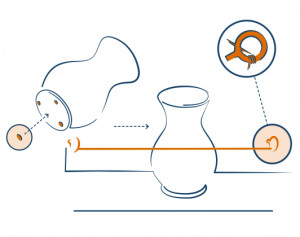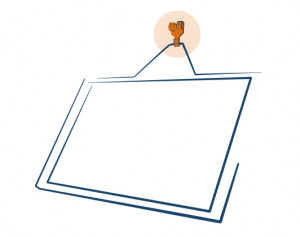Quick and easy safety steps
Take action today to protect your valuables and your loved ones.
Secure heavy and breakable items
Items on shelves can easily fall, even in smaller earthquakes. During stronger shaking, cupboards can fly open and items fall out. Take steps today to protect your valuables and save yourself the hassle of cleaning up a big mess.

- Stick Blu Tack or Quake Wax to the base of fragile ornaments or precious objects to help keep them in place.
- Add a positive catching latch to cupboards or drawers that hold fragile items. Make sure the latch isn’t magnetic, as they may not hold during a quake. Child-proof latches with a mechanical action are best.
- String cord, nylon or curtain wire in front of books and other items on a shelf to lessen the chances of them falling or flying off in a quake.
Correctly hang picture frames and mirrors
Wire hung picture frames can jump out of their hooks during earthquakes. It’s important to use appropriate hooks for the size and weight of the item – that means no hanging items on single nails.

- Conventional single-nail picture hooks are fine for light pictures as long as the nail has been hammered into something solid like a wall stud.
- Anything a little heavier will need a two or three-nail picture hook, or possibly several hooks. Very heavy pictures or mirrors may need something even stronger. Also, don’t forget to use strong cord, not light string.
- Once you have nailed the hook into place, hang the picture and then pull it out so you can get your hand behind it and push the hook closed.
Know how to turn off water and gas
After a disaster you may need to turn off the gas and water supplies to your home – and quickly.
- Make sure you know where your emergency cut-off switches and taps for gas and water are. You can place a tag on shut-off valves to make them easier to identify.
- If you need them, make sure that you have necessary tools in an obvious place close to the gas and water shut-off valves.
- Turn off utilities only if you suspect a leak or damaged lines, or if you are instructed to do so by authorities. If you turn the gas off, you will need a professional to turn it back on.
More safety information on gas leaks can be found on WorkSafe's website(external link).
External information
Personal safety
If a disaster happened tomorrow, would you be ready? Civil Defence explains how to make a plan before an emergency happens.
Local councils
Your local council has information you can use to reduce your risk during a natural disaster. Find yours here.
Our natural hazards
New Zealand has many natural hazards. GNS Science helps us understand what these are and how we can increase our resilience.